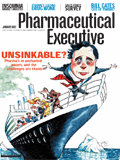Back Page: Of Movies and Drugs
Pharmaceutical Executive
A free flow of cheap counterfeits eclipses the ability of local manufacturers to create new products.
The stage is set for Vietnam's accession to the World Trade Organization (WTO) on January 11. This momentous achievement signals a developing country's readiness to open its markets and engage in fair trade across the economic spectrum, including the closely protected pharmaceutical industry.
This change is due. The Vietnamese population has rapidly increased in the last quarter century, the majority of its citizens were born after the "American War," and the bulk of the nation has moved forward in search of new opportunities. In certain economic sectors, opportunism has been unbridled. The results have been mixed, with short-term economic gains obscuring longer-term consequences.
There is no better example of this than Vietnam's DVD industry. Movies and pharmaceuticals may seem unrelated. But in Vietnam, they are part of markets that obey very similar rules—rules that shed light on the challenges faced by pharmaceutical manufacturers, prescribing doctors, and ill patients who desire ready access to safe and effective medications.
Vietnam's nascent movie industry suffers from limited means of production, small budgets, and an unknown audience. In the absence of high-quality domestic films, people rely on imported movies, mostly watching them at home on cheap and ubiquitous DVD players. DVD shops dot city streets and the crossroads of rural towns, offering Hollywood blockbusters, documentaries, and the latest television shows. The price for a DVD of the latest blockbuster: $1.
The immediate and superficial effects of $1 DVDs are alluring. Hundreds of thousands of customers derive satisfaction, or at least diversion. By selling just a handful of movies, vendors support their families. And in a nation where annual per capita income has yet to crest $1,000, the dollars generated circulate widely and repeatedly, each transaction stirring the economy.
The longer-term effects of $1 DVDs are not so helpful. Product quality is uneven and undependable. The original content creators are not reimbursed for their efforts. This deters them from introducing higher-quality products into pirate-tolerant economies, and undermines their ability to develop products for any market. A free flow of cheap counterfeit copies also eclipses the ability of legitimate local manufacturers to create products specific to the needs of their compatriots—reinforcing a cycle of product homogenization and reliance on foreign manufacturers.
As with DVDs, the pharmaceutical marketplace in Vietnam has been infiltrated with products of uncertain pedigree. Sophisticated packaging lends an appearance of legitimacy to products that may or may not have been produced under GMP and imported through reputable channels. With low-cost prescription-optional pharmacies rivaling the number of DVD shops, potential profits are diluted. More important, the taint of association with an inert or hazardous substance disguised within a respected brand inhibits legitimate manufacturers from introducing needed products to the nation's healthcare market.
Lack of confidence in medication potency prompts some doctors to prescribe double or triple doses—a common practice that tempts serious side effects. A similar lack of confidence on the part of patients lures them into trying bizarre multi-drug combinations.
Defective DVDs are not lethal to people. The same cannot be said of defective or unavailable medications. Vietnam's Ministry of Health (MOH) well understands the difference and has been one of the more active governmental agencies in its response to intellectual property infringement. By helping safeguard against disrupted or incomplete pharmacoassurance, the MOH has demonstrated its appreciation of what's at stake as WTO accession nears: market share and human health.
As the expertise of drug counterfeiters and pirates grows, the MOH must increase its collaborations with international pharmaceutical manufacturers, distributors, and monitors. Close cooperation will help Vietnam meet the fair trade and regulatory obligations of the WTO, and confirm that the nation is both a lucrative place to do business and a safe place to receive healthcare.
Peter G. Teichman is medical director of the Victoria Healthcare International Clinic in Ho Chi Minh City, Vietnam
The Market US trade with Vietnam has increased 400 percent over the last five years to reach almost $8 billion a year, according to US government figures. Vietnam is Southeast Asia's fastest-growing economy, with a GDP of $52 million. (That's a 50-percent increase in five years.) And Southeast Asia, with a population of 570 million, is the fourth-largest American market.

Navigating Distrust: Pharma in the Age of Social Media
February 18th 2025Ian Baer, Founder and CEO of Sooth, discusses how the growing distrust in social media will impact industry marketing strategies and the relationships between pharmaceutical companies and the patients they aim to serve. He also explains dark social, how to combat misinformation, closing the trust gap, and more.
Pfizer, GSK Gain ACIP Recommendations for RSV and Meningococcal Vaccines
April 18th 2025The Centers for Disease Control and Prevention’s Advisory Committee on Immunization Practices voted to expand access to Pfizer’s respiratory syncytial virus vaccine Abrysvo for high-risk adults in their 50s and voted in favor of GSK’s meningococcal vaccine, Penmenvy, for streamlined adolescent protection.